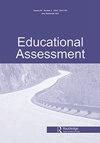制定形成性评估协议以检查菲律宾的形成性评估实践
IF 2.3
Q1 EDUCATION & EDUCATIONAL RESEARCH
引用次数: 10
摘要
摘要本文探讨了通过观察工具捕捉菲律宾课堂教师形成性评估行为的方法。该工具的早期版本使用“引出-学生响应-识别-使用”ESRU模型构建。为了解释在课堂上观察到的实践,观察工具被设置为关注引出(E)和使用(U)组件。考虑到菲律宾课堂的文化和物理因素,有助于确保观察工具能够反映课堂上的当前做法。该工具的数据预计将为菲律宾教育部提供信息,因为他们开始发展教师在形成性评估中的能力。该工具的最终版本以可靠的方式捕获了基本实践。该工具提供了一个提高形成性评估实施能力的模型,可用于设计教师培训模块和专业发展。本文章由计算机程序翻译,如有差异,请以英文原文为准。
Developing a Formative Assessment Protocol to Examine Formative Assessment Practices in the Philippines
ABSTRACT This paper explores ways of capturing teachers’ formative assessment behaviors in Philippine classrooms through an observation tool. Early versions of the tool were structured using the ‘Elicit-Student response-Recognize-Use’ ESRU model. To account for the practices observed in the classroom, the observation tool was resituated to focus on Elicit (E) and Use (U) components. Both cultural and physical factors that characterize the Philippine classroom were considered to help ensure that the observation tool would reflect current practices in classrooms. Data from the tool are envisioned to inform the Philippines’ Department of Education as they embark on the development of teacher competencies in formative assessment. The final version of the tool captures the basic practices in a reliable way. The tool provides a model of increasing competency in formative assessment implementation that can be used to design teacher training modules and for professional development.
求助全文
通过发布文献求助,成功后即可免费获取论文全文。
去求助
来源期刊

Educational Assessment
EDUCATION & EDUCATIONAL RESEARCH-
CiteScore
3.20
自引率
6.70%
发文量
24
期刊介绍:
Educational Assessment publishes original research and scholarship on the assessment of individuals, groups, and programs in educational settings. It includes theory, methodological approaches and empirical research in the appraisal of the learning and achievement of students and teachers, young children and adults, and novices and experts. The journal reports on current large-scale testing practices, discusses alternative approaches, presents scholarship on classroom assessment practices and includes assessment topics debated at the national level. It welcomes both conceptual and empirical pieces and encourages articles that provide a strong bridge between theory and/or empirical research and the implications for educational policy and/or practice.
 求助内容:
求助内容: 应助结果提醒方式:
应助结果提醒方式:


